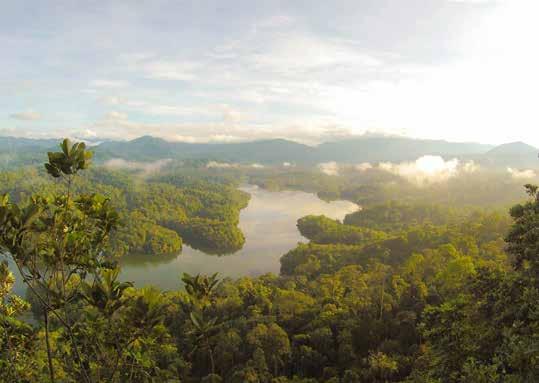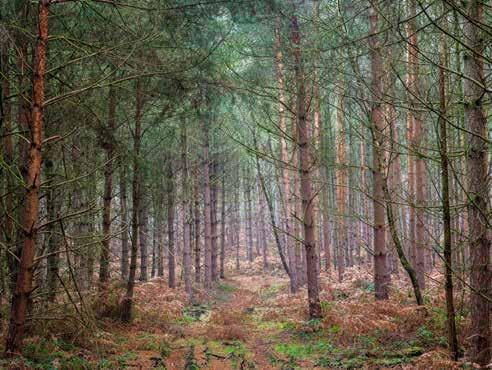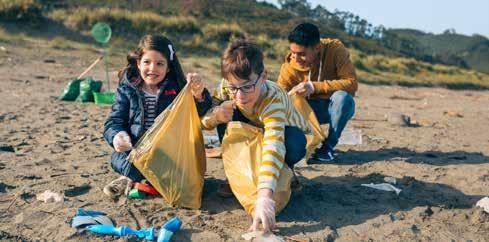
6 minute read
Eco-anxiety: a healthy response to the climate crisis
ECO-ANXIETY:
A HEALTHY RESPONSE TO THE CLIMATE CRISIS
Advertisement
In this special feature, we explore some of the effects of the climate crisis on the mental health of young people and offer advice we hope may help. Climate change has significant implications for the health and futures of children and young people, yet they have little power to limit its harm, making them vulnerable to increased climate anxiety. That anxiety is known as eco-anxiety, and while there is no clear definition, it has been explained by the American Psychological Association as ‘a chronic fear of environmental doom.’
It’s not considered a medical condition, although generalised anxiety disorder is, and eco-anxiety has many of the same characteristics. However, it’s important to see it as a healthy reaction to climate change that may spur us on into preventative action, which, in turn, may even be a remedy for eco-anxiety. A recent survey of 10,000 young people aged 16-25 in 10 countries1 found that:
• 59 percent were very or extremely worried about climate change. • Over 50 percent felt sad, anxious, angry, powerless, helpless and guilty. • Nearly half (45 percent) said that climate change is affecting their daily lives – how they play, eat, study and sleep. Anxiety is also associated with perceptions of inadequate action by adults and governments, leading to feelings of betrayal, abandonment and moral injury. Young people feel that they are not being listened to – their thoughts and feelings are not being respected or validated; and people in positions of power are not acting on their concerns.

In a survey of UK schoolchildren between the ages of 13 and 18, 77 percent said that thinking about climate change made them anxious2. In the same survey, completed by Global Action Plan, one in three teachers also reported seeing high levels of climate anxiety in students. Children might be concerned that a major disaster is about to happen, or worry about death and dying of animals and people, or question whether to have children or pursue a career. They might feel a huge responsibility to make changes and the need to convince others to do the same.
We asked two of the Trust’s younger members of staff whether they identified with those concerns. Natasha Austen said: “There’s a generational divide – young people blame the older generation. I feel it’s important to lobby against the big organisations that are doing the most damage. Companies and governments need to do something – I don’t understand how they don’t seem to care about the future. I feel disempowered. The people who could do something aren’t.” Eve Lownds has very similar views. “It’s very overwhelming. People feel powerless, frustrated and angry but by making small changes, like recycling, it’s easier to deal with. It’s important to acknowledge that it’s not a mental illness but a natural reaction to what’s happening – and that other people feel like you, which helps you to manage it.”

Top tips for young people experiencing eco-anxiety
Be aware of the situation – keep up to date with information about the environment either by talking to an adult or looking up a reliable website. But take care not to overload yourself with too much information.
Take time to focus on other things and activities that you enjoy. Understand, experience and cope with the feelings that come up. Remember that these feelings are a sign that you care about other people and the environment. Express how you feel – that could be by writing, creating art or playing music. Stay hopeful and connected. Talk to people – there are many others feeling the same way. Remember there are lots of people working on solutions that could help make the world happier, healthier and safer. Spend time in a natural environment – such as a park or garden if you have access to one. Take action and do something differently, however small it feels. Always remember that this is everyone’s responsibility, not just yours. Think about connecting with groups of young people, either in your local area or online, who feel the same way. Make changes that feel right for you – for example planting wildlife friendly flowers, reducing the amount of rubbish you make or talking to your family about ways you can all help, such as eating less meat.
This advice is based on information given by the Royal College of Psychiatrists. You can find full details at https://www.rcpsych. ac.uk/mental-health/parents-and-youngpeople/young-people/eco-distress---foryoung-people

As CEO of the Charlie Waller Trust, Clare Stafford wants to ensure that the charity’s work reflects the concerns and experiences of young people – and those who care for them – in relation to the climate crisis. She says: “As providers of training and resources on the mental health of children and young people, we have to ensure we are addressing the topics that may make them more vulnerable to mental health issues.
“Whilst concern about the planet is, of course, not a mental health condition in itself, the anxiety it causes can exacerbate existing problems or make young people more susceptible to a decline in their wellbeing. “It has been suggested that climate anxiety could be classed as an adverse childhood experience, and we know that these have the potential to lead to mental health problems. We have to ensure we are addressing the topics that may make children and young people more vulnerable to mental health issues.

“It is important, however, to frame climate anxiety as a positive, in the sense that it indicates the care and empathy that young people have for the world. We need to support them to take constructive action and to feel good about the contributions they are making to the debate and to addressing global challenges.” In summary, we need not to pathologise eco-anxiety, but to listen to young people’s concerns and empower them to know that they can take action. Not just as healthcare professionals but also as parents and carers, we need to model engaged and global citizenship that children can emulate, helping them to feel more hopeful about the times that lie ahead.
It is important to frame climate anxiety as a positive, in the sense that it indicates the care and empathy that young people have for the world. We need to support young people to take constructive action and to feel good about the contributions they are making to the debate and to addressing global challenges.
As a mental health organisation, the Charlie Waller Trust understands the implications of climate change as a factor in the mental health of children and young people. The Trust is also committed to reducing its carbon footprint and to taking whatever steps it can to consider the environment. You can read our policy on this on our website.
References
1 Marks, E., Hickman C., Pihkala P., Clayton S., Lewandowski E., Mayall E., Wray B., Mellor C., van Susteren L. (2021) Young People’s Voices on Climate Anxiety, Government Betrayal and Moral Injury: A Global Phenomenon 2 Global Action Plan (2020), Transform Our World press release: Turning anxiety in to action’, https://www.globalactionplan.org.uk/news/ transform-our-world-press-releaseturninganxiety-into-action











